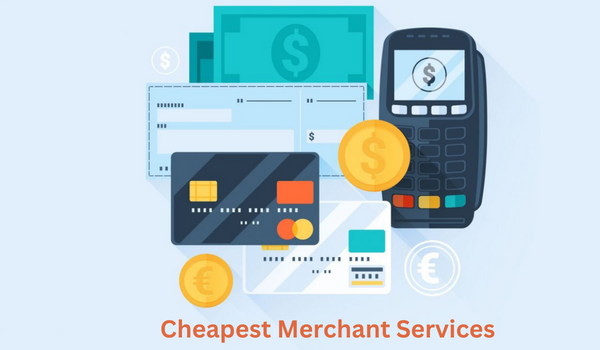
Comparing Merchant Services and PayPal: Overview
When it comes to accepting payments online, there are many options available for businesses, but two of the most popular choices are Merchant Services and PayPal. Merchant Services in California refer to the range of financial services that enable businesses to accept payments from customers, such as credit card and debit card transactions.
On the other hand, PayPal is a digital payment platform that allows individuals and businesses to make and receive payments online, including through credit cards, bank transfers, and PayPal account balances. In this comparison, we will look at the features, cost, ease of use, customer service, and security and fraud prevention measures of both, Merchant Services and PayPal to help you determine which option may be best suited for your business needs.
Definition and Features of merchant services
Merchant Services are financial services provided to businesses to facilitate payment processing. These services enable businesses to accept various payment methods such as credit cards, debit cards, and e-wallets. Merchant Services can be provided by banks, financial institutions, or third-party payment processors. Some of the key features of Merchant Services include fraud prevention, chargeback management, and reporting tools. Many Merchant Services providers offer integration with popular e-commerce platforms and shopping carts, making it easier for businesses to set up their online payment systems.
Pros
- Acceptance of various payment methods
- Integration with e-commerce platforms
- Fraud prevention and chargeback management tools
- Reporting tools for financial analysis
Cons
- Transaction fees, monthly fees, and other associated costs
- Approval process and criteria before acceptance
- Dependence on the Merchant Services provider for payment processing
Payment Processing Fees
Merchant Services include various costs such as transaction fees, monthly fees, and chargeback fees. Transaction fees are typically charged as a percentage of the transaction amount, while monthly fees can vary depending on the volume of transactions. Chargeback fees may be charged if a customer disputes a transaction and requests a refund.
Integration with Different Platforms
Merchant Services can be integrated with various e-commerce platforms and shopping carts such as Shopify, WooCommerce, and Magento. This allows businesses to easily set up their online payment systems and manage their transactions in one place.
Security and Fraud Prevention
Merchant Services providers often offer security and fraud prevention tools to help protect businesses from fraudulent transactions. These tools may include encryption, tokenization, and fraud detection algorithms. Some providers may also offer chargeback management tools to help businesses resolve disputes with customers.
Definition and Features of Paypal
A digital payment platform which helps individuals and businesses to accept and make payments online is the core of what Paypal offers. PayPal allows users to link their bank accounts, credit cards, and debit cards to their PayPal account, and use those payment methods to make and receive payments. PayPal also offers a mobile payment app and a range of other payment solutions for businesses, including invoicing and payment buttons for websites. PayPal is available in over 200 markets worldwide and supports multiple currencies.
Pros
- Easy to set up and use
- Wide acceptance and popularity
- Mobile payment app available
- Multiple payment methods supported
Cons
- Transaction fees may be higher than other options
- Limited customization options for payment buttons and checkout process
- Dependence on PayPal for payment processing
Payment Processing Fees
PayPal charges a transaction fee of 2.9% + $0.30 per transaction for payments received within the US. International transactions will attract additional fees. PayPal also offers a range of payment solutions for businesses that may have different pricing structures.
Integration with Different Platforms
PayPal can be integrated with various e-commerce platforms and shopping carts, including Shopify, WooCommerce, and Magento. PayPal also offers payment buttons and checkout solutions for websites that do not use an e-commerce platform.
Security and Fraud Prevention
PayPal offers a range of security and fraud prevention measures, including encryption, two-factor authentication, and fraud detection algorithms. PayPal also offers Seller Protection for eligible transactions, which can help protect businesses from fraudulent chargebacks and disputes.
Merchant services and Paypal comparison
Pricing Comparison
Merchant Services and PayPal have different fee structures. Merchant Services typically charge transaction fees, monthly fees, and other associated costs, while PayPal charges a transaction fee and additional fees for certain payment solutions. Businesses should compare the fees associated with each option to determine which is more cost-effective and best suited for their needs.
Features Comparison
Merchant Services and PayPal offer different features. Merchant Services may offer additional tools such as chargeback management and reporting tools, while PayPal offers a mobile payment app and invoicing solutions. Businesses should consider their specific needs and which features are most important to them.
Ease of Use Comparison
PayPal is generally considered to be easier to set up and use than Merchant Services. PayPal's user interface is straightforward and user-friendly, while Merchant Services may require more technical expertise to set up and manage.
Customer Service Comparison
Merchant Services and PayPal both offer customer support, but the level of support may vary. Some Merchant Services providers may offer dedicated account managers and 24/7 support, while PayPal offers email and phone support during business hours.
Security and Fraud Prevention Comparison
Merchant Services and PayPal both offer security and fraud prevention measures, but the specific tools and features may vary. Businesses should review the security measures offered by each provider to determine which is most suitable for their needs.
Overall, the choice between Merchant Services and PayPal will depend on the specific needs and preferences of each business. Businesses should carefully evaluate the features, costs, ease of use, customer service, and security measures of each option to determine which is the best fit for their needs.
Summary of Comparison
Merchant Services and PayPal both offer online payment solutions for businesses, but they have different fee structures and features. Customer service, and security measures will also differ. Merchant Services may offer additional tools and features, but may require more technical expertise to set up and manage. PayPal is generally considered easier to use, but may have higher transaction fees. Businesses should evaluate their specific needs and preferences to determine which option is the best fit for them.
Based on the comparison, if a business requires more advanced tools and features, and is willing to invest more time and resources into setup and management, then Merchant Services may be the best option. However, if ease of use and convenience are top priorities, and the business is willing to pay higher transaction fees, then PayPal may be a better choice.
As online payment technology continues to evolve, businesses should continue to evaluate and compare different payment solutions to determine which fits their needs the best. New players may emerge in the market, and existing providers will continue to innovate and improve their offerings. It is important for businesses to stay up-to-date on the latest developments in the industry and regularly review their payment solutions to ensure they are meeting their needs and providing the best possible experience for their customers.







